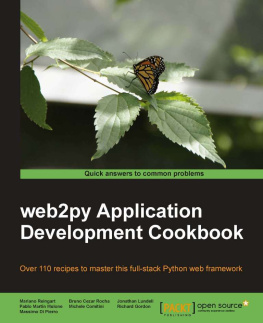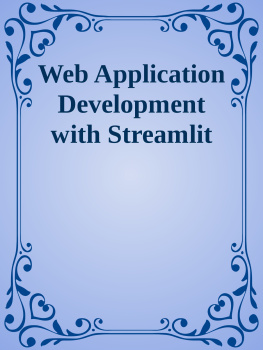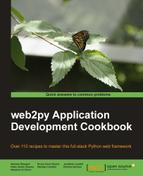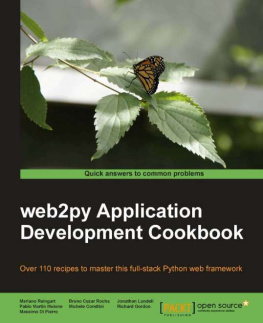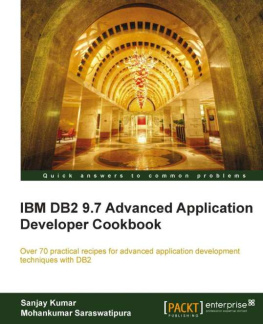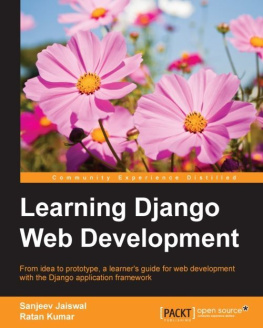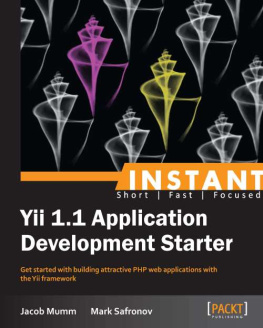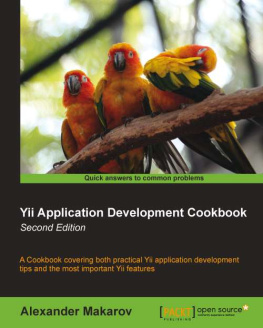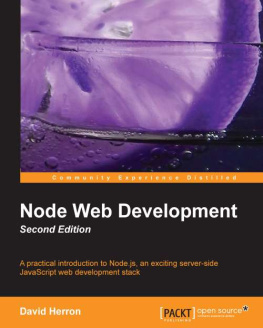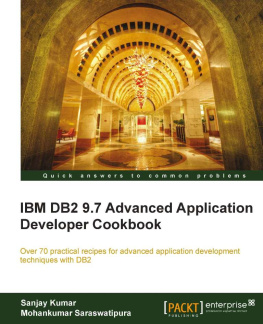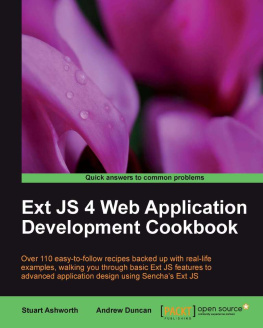About the Authors and Reviewers
Mariano Reingart lives in Buenos Aires (Argentina), and is a specialist in database administration, and development of software applications and libraries (web services, PDF, replication, and so on), with more than 10 years of experience. Currently, he is the PostgreSQL regional contact for Argentina and a web2py contributor, with more than 14 open source projects, including interface for Free Electronic Invoice web services (PyAfipWs) and Pythonic Replication for PostgreSQL (PyReplica).
Mariano has a bachelor's degree in Computer Systems Analysis from the University of Morn, and currently works on his own funded startup formed by an open group of independent professionals, which is dedicated to software development, training, and technical support, focusing on open source tools (GNU/Linux, Python, PostgreSQL and web2py).
Mariano has worked for local Python companies in large business applications (ERP, SCM, and CRM) and mission critical systems (election counting, electronic voting, and 911 emergency events support). He has contributed to the book web2py Enterprise Web Framework 3rd Edition , and for several Spanish translation efforts of the PostgreSQL official documentation. You can find his resume at: http://reingart.blogspot.com/p/resume.html.
Bruno Cezar Rocha is a web developer and entrepreneur. He is the co-founder and lead developer at http://www.blouweb.com, a micro-company dedicated to web2py/Python web development and training. He is the lead teacher in Curso de Python (http://www.CursoDePython.com.br), an initiative to offer online courses of Python and web2py to Brazilian companies and educational institutes.
He is the Vice President of the Python Brazilian Association, which is the organizer of PyCon Brazil, and other Python-related events in his country.
He is an entrepeneur focused on SaaS products powered by web2py at http://www.ansy.me/en, which is a pioneer in web-based systems for veterinarians and pet shops, and creator of http://www.movu.ca, a social network engine and CMS powered by web2py.
You can find his resume at: http://www.rochacbruno.com.br
Jonathan Lundell leveraged a background in the philosophy of Ludwig Wittgenstein, into an exciting career in computer systems design. These days, he uses web2py to provide cloud services to his iOS apps, written for Lobitos Creek. He's getting used to Objective-C, but can't help wishing that Steve Jobs had been a Python fan.
Pablo Martn Mulone is a full-time web developer and software designer. He co-runs his own company located in Argentina, which is dedicated to bring IT solution to libraries, archives, and government in matter of documentary preservation. He has an extensive experience in FLOSS projects and associated tools. He is the creator of instant2press and CMS/ blog that is developed in web2py framework. His company created the patrimoniosf. gov.ar heritage database, which was built for the state government of Santa Fe.
Michele Comitini is a programmer, a consultant, and an entrepreneur, with 20 years of experience in the field of open source software development. Michele has worked with many of the top Information and Communication Technology (ICT) companies in Italy. His skills include the ability to program in many languages and some of the most popular web frameworks. Michele was a Linux early adopter, and he has developed a deep knowledge of the Linux/Unix operating systems as well as its use in embedded systems.
Michele is the owner and CEO of GliscoS.R.L., a consulting and development firm that is specialized in mission critical or highly customized software. His customers are mostly companies in the ICT and in the financial sectors.
Richard Gordon has 30 years of experience in agile web development and industrial design-automation software. He has a Master's degree in Electrical Engineering from Stanford University and a Science Baccalaureate with honors from Brown University. His career spans microprocessor design at AT&T Bell laboratories, electronic-design-automation, software development at Mentor Graphics and Tera Systems, which he founded. He is the founder and lead YAK at YAKiToMe! Co., the Internet's first text-to-speech SaaS portal.
Massimo Di Pierro is an associate professor at the School of Computing of DePaul University in Chicago, where he directs the Master's program in Computational Finance. He also teaches courses on various topics, including web frameworks, network programming, computer security, scientific computing, and parallel programming.
Massimo has a PhD in High Energy Theoretical Physics from the University of Southampton (UK), and he has previously worked as an associate researcher for Fermi National Accelerator Laboratory.
Massimo is the author of a book on web2py, and more than 50 publications in the fields of Physics and Computational Finance, and he has contributed to many open source projects. He started the web2py project in 2007, and is currently the lead developer.
We wish to thank all the web2py contributors and web2py users, but, in particular, we want to thank those users who have contributed examples on http://www.web2pyslices.com/, as some of them have been used as a basis for the recipes in this book. They are:
Nathan Freeze, Hans Christian von Stockhausen, BenignoCalvo, Chih-Hsiang Hsu, Renato Caliari, Rob Powell, David Harrison, Richard Penman, Teru Homma, Brian M., Jon Vlachoyiannis, KubaKucharski, Anton Georg Mckl, Falko Krause, Mike Ellis, Karl Bochert, Alexandre Andrade, Mark Carrier, Timothy Farrell, Martin Sagastume, Carlos Costa, Fred Gansevles, John Heenan, Ionel Anton, Alex Pearson, Dmitry Sherbina, Evan Gray, Nico de Groot, Igor Gassko, John Tynan, Karol Grobski, Dieter Asman, Mark Pettit, Marco Laspe, Yarin Kessler, PietroBertera, Jeffrey Berube, huimies, Janis Vizulis, Jose Jachuf, Chris Steel, Patrick Breitenbach, Patrick Breitenbach, Ariel Gonzalez, ArunRajeevan, Victhor, Zimba, BogdanHlevca, Nico de Groot, Pierre Thibault, Ai Lau, Gilson Filho, Matt Gorecki, UolterUolter, and Jim Karsten.

